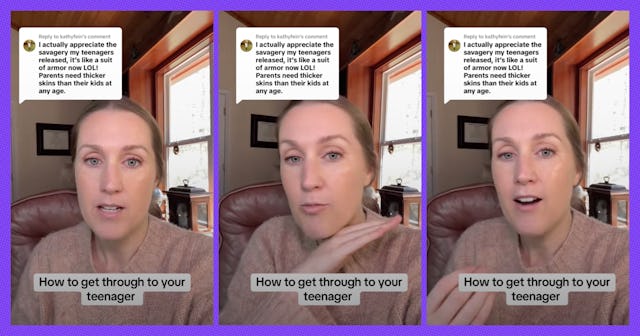How To Get Through To Your Teen When They’re Being Rude AF
Those moments when they come in with guns blazing can actually be an opportunity to connect.

Nobody knows exactly what buttons to press like your teenager. It’s a talent, really. They somehow always know the exact thing to say to get under your skin, and they do not hold back.
Kate Gray, aka Codependency Kate, a licensed marriage and family therapist, says that teenagers’ disrespectful — and sometimes even shocking — behavior is a result of not knowing how to express difficult emotions in the moment — but, it can also be an opportunity for parents to meet their teen where they’re at.
Gray explained that, in her experience providing teens with therapy, they can occasionally come out with guns blazing. One example: one patient’s immediate reaction to her was to point out and criticize her weight.
That might sound entirely out of pocket. Or, you might have a teen yourself, so you’re understandably unfazed. As for Kate, she explains why, and how, she doesn’t let such extreme, rude comments get to her.
“If I felt like their behavior was a result of my therapy with them, that might hurt me or that might make me have an emotional reaction. I might also have an emotional reaction if I think I've gained weight and I'm insecure about it,” she said. “So do you notice that all has to do with me?”
If she reacted negatively to angry teen, Kate says she would be addressing her own issues — but, this outburst is proof that the child has their own problems to handle in this moment. So, how should parents go about it?
First, Gray says, validate what they said (to an extent — you can address it fully later).
“I'm like, ‘Wow, coming in hot today. Okay. I mean, it's kind of true, I have and I really I didn't realize it was that noticeable,’” she said.
Then, gray would ask, is something else going on? She says that across the board, teens will almost immediately unload, and share that they had a bad day at school, or are stressed — and suddenly, it becomes clear that their disrespect came from a place of hurt.
“Some parents, they struggle to validate parts of their child's experience if their behavior is so shocking,” Kate explained. “They don't get to the validation attachment place. They stop at the behavior. They're like, ‘Wow, that's really disrespectful. Go to your room.’ It's like, you're completely missing them.”
Gray says that, after giving teens the space to connect and express their frustration, then parents can go back and address the initial disrespectful comment — but, they should still lead with empathy, not accusations.
“Where did you learn to do that? Did someone say that to you? Did you say that to someone? What was the context for that? Well, you know, I noticed that you kind of say shocking things like that when you have a lot going on emotionally. Do you notice that?” she said.
Gray understood that her approach might get some push-back, or be perceived as lacking discipline. But, she argues that it’s the best way to get to the root of the issue.
“You're not validating them and saying the behavior is okay, but you're looking underneath it, and your approach to addressing it is not about respect, and it's not about you,” she said.
However, the vast majority of the comment section actually agreed with Kate’s take.
“I don’t always handle it right but when i’m able to snap out of my own reaction to my kid being mean & ask ‘ru ok? did something happen at school?” she’ll immediately burst into tears & tell me 💔❤️🩹” one mom said.
“SO MUCH of parenting is controlling your own hurt responses long enough to focus back on the little human we’ve been tasked with and blessed to be raising,” said another.
“A lot of times it seems like they are testing the safety of the room. is this person emotionally stable or can I quickly destabilize them. they are looking for HOW THEY should react to that too,” another commenter agreed.
So, yes, your teen is probably mean AF — but, you’ve made a safe space for them to express themselves, and for that, you deserve a pat on the back.